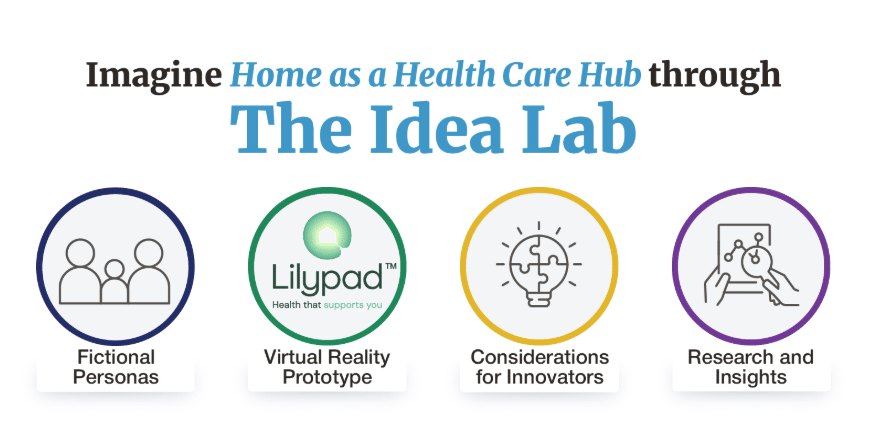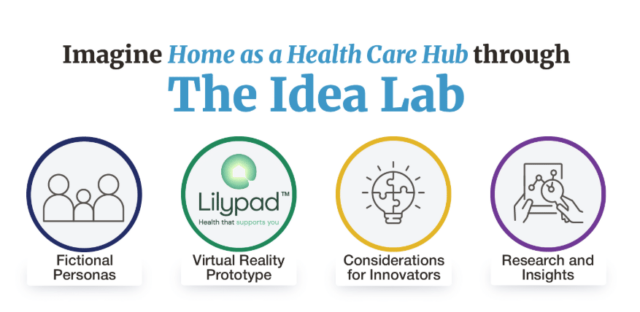
Bethesda, MD, 01/16/2025 – The American Occupational Therapy Association (AOTA) is pleased to support the release of the U.S. Food and Drug Administration’s (FDA) Center for Devices and Radiological Health’s The Idea Lab, as part of its Home as a Health Care Hub initiative, to help innovators, providers, and patients reimagine the home as an integral part of the health care system.
The Idea Lab features a virtual reality prototype named Lilypad™, which gives users an immersive experience inside various affordable homes of representative people living with diabetes, and will provide a realistic look into the challenges and barriers people face navigating medical conditions in their daily lives. The Idea Lab also includes insights from patients, caregivers, providers and experts, tours of different types of affordable housing environments, and highlights landscape research into design opportunities ripe for innovation.
In April 2024, the American Occupational Therapy Association was selected to serve on the FDA’s Home as a Healthcare Hub Steering Committee. In addition, the American Occupational Therapy Association was invited to the listening session that helped inform Lilypad’s prototype development, as occupational therapy practitioners have a unique and critical understanding of the supports and barriers that exist in the home environment, and routinely provide counsel to home builders and designers based on their expertise analyzing the fit between people, environments, and occupations.
AOTA’s listening session representative and Chief Operating Officer, Sharmila Sandhu, JD said, “As the national professional organization representing occupational therapy, AOTA asserts that the inclusion of housing and home modification considerations is critical at a time when payers, policymakers, and quality experts are recognizing the importance of social determinants of health or social risk in the overall risk, profile, and recovery trajectory for patients. The American Occupational Therapy Association continues to believe it is critical to incorporate key social determinants of health – in particular, housing status – into the fabric of health, care, coverage, and payment.”
The current health care system focuses primarily on how health care is delivered, through hospitals, clinics, and providers – rather than the patients themselves. This has contributed to the inability to meet the health care needs of millions of people who have no or limited access to health care systems. Focusing care, technology use and clinical evidence generation on patients – specifically, where they live – may help to address some of the challenges that patients and caregivers face.
Sabrena McCarley, MBA-SL, OTR/L, CLIPP, RAC-CT, QCP, FAOTA, RAC-CTA, Vice President of Clinical Reimbursement and Regulatory Affairs, Transitional Care Management, The American Occupational Therapy Association volunteer leader, and Home as a Healthcare Hub Steering Committee member added that, “Focusing on the home as the individual’s healthcare hub allows us to gain insight and tailor interventions around those social determinants of health items that we know can either have a positive or a negative impact on health equity such as income, social support, and the setup of a home environment. These are all very important factors when we talk about determining home modifications and technology recommendations.”
Expert insights, like those provided by the American Occupational Therapy Association, are intended to help the FDA, innovators, and other interested parties better understand how current medical devices fit into people’s homes and lives. Lilypad will allow users to visualize and build integrative solutions, including innovating new home use devices, and imagine ways to adapt existing devices to better meet the needs of patients and caregivers in the home environment. It may also help identify opportunities to optimize patient use of the technologies, as well as serve as a virtual test environment to advance healthcare technologies.
“Occupational therapy plays a distinct and critical role in the health and well-being of caregivers and patients and can often make the key difference in quality of life for individuals living with chronic disease,” said AOTA Chief Executive Officer, Katie Jordan, OTD, OTR/L, FAOTA. She continued, “We thank the FDA for the opportunity to represent the occupational therapy profession in this critical discussion. The American Occupational Therapy Association stands ready to continue to contribute to this and future initiatives, and recognizes the home environment as an integral part of the healthcare system for all people in the United States.”
About The American Occupational Therapy Association
Founded in 1917, the American Occupational Therapy Association (AOTA) represents the professional interests and concerns of more than 244,000 occupational therapists, assistants, and students nationwide. The Association educates the public and advances the profession of occupational therapy by providing resources, setting professional and educational standards, and serving as an advocate to improve health care. Based in Bethesda, Md., AOTA’s major programs and activities are directed toward promoting the professional development of its members and assuring consumer access to quality services so patients can maximize their individual potential. For more information, go to www.aota.org.
Local News Via - MyrtleBeachSC.com










